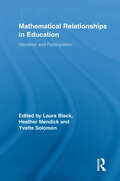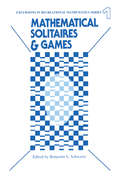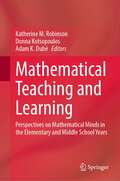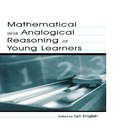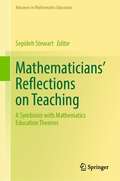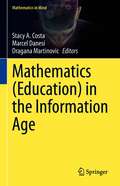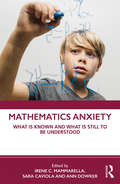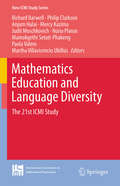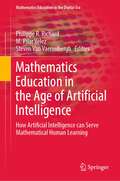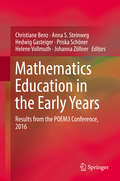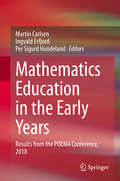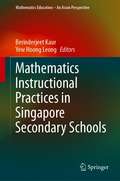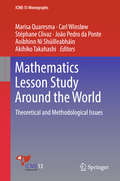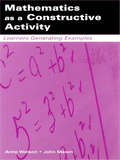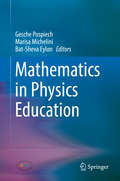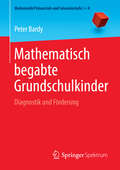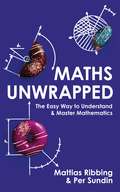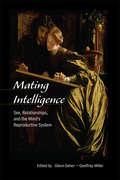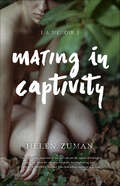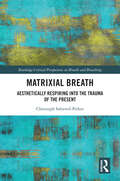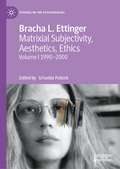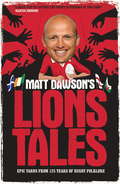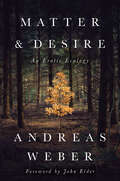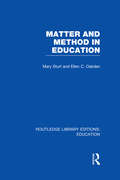- Table View
- List View
Mathematical Relationships in Education: Identities and Participation (Routledge Research in Education)
by Heather Mendick Laura Black Yvette SolomonThis book brings together scholars working in the field of mathematics education to examine the ways in which learners form particular relationships with mathematics in the context of formal schooling. While demand for the mathematically literate citizen increases, many learners continue to reject mathematics and experience it as excluding and exclusive, even when they succeed at it. In exploring this phenomenon, this volume focuses on learners' developing sense of self and their understanding of the part played by mathematics in it. It recognizes the part played by emotional responses, the functioning of classroom communities of practice, and by discourses of mathematics education in this process. It thus blends perspectives from psychoanalysis, socio-cultural theory and discursive approaches in a focus on the classic issues of selection and assessment, pedagogy, curriculum, choice, and teacher development.
Mathematical Teaching and Learning: Perspectives on Mathematical Minds in the Elementary and Middle School Years
by Katherine M. Robinson Donna Kotsopoulos Adam K. DubéThis book focusses on teaching and learning in elementary and middle school mathematics and suggests practices for teachers to help children be successful mathematical thinkers. Contributions from diverse theoretical and disciplinary perspectives are explored. Topics include the roles of technology, language, and classroom discussion in mathematics learning, the use of creativity, visuals, and teachers’ physical gestures to enhance problem solving, inclusive educational activities to promote children’s mathematics understanding, how learning in the home can enhance children’s mathematical skills, the application of mathematics learning theories in designing effective teaching tools, and a discussion of how students, teachers, teacher educators, and school boards differentially approach elementary and middle school mathematics. This book and its companion, Mathematical Cognition and Understanding, take an interdisciplinary perspective to mathematical learning and development in the elementary and middle school years. The authors and perspectives in this book draw from education, neuroscience, developmental psychology, and cognitive psychology. The book will be relevant to scholars/educators in the field of mathematics education and also those in childhood development and cognition. Each chapter also includes practical tips and implications for parents as well as for educators and researchers.
Mathematical and Analogical Reasoning of Young Learners (Studies in Mathematical Thinking and Learning Series)
by Lyn D. EnglishMathematical and Analogical Reasoning of Young Learners provides foundational knowledge of the nature, development, and assessment of mathematical and analogical reasoning in young children. Reasoning is fundamental to understanding mathematics and is identified as one of the 10 key standards for school mathematics for the new millennium. The book draws on longitudinal and cross-cultural studies, conducted in the United States and Australia, of children's reasoning development as they progressed from preschool through the end of second grade. The multifaceted analysis of young children's development of mathematical and analogical reasoning focuses on individual learners, their learning environments, and the interaction between the two. The multidisciplinary team of authors present multiple perspectives and multiple methodologies, and provide valuable information on organizing and sustaining interdisciplinary and cross-cultural inquiry. Key issues addressed include: *the relationship between mathematical and analogical reasoning; *how changes in children's reasoning relate to the implicit instruction they receive in their classrooms; *analyses of the participating teachers' knowledge, beliefs, and practices with respect to mathematical and analogical reasoning of young learners; and *ways in which we might promote development of mathematical and analogical reasoning in young children. This volume is highly relevant for mathematics educators, researchers in mathematics education, educational psychologists, early childhood teachers, and others interested in mathematical development of young children, in particular, the development of their reasoning processes.
Mathematicians' Reflections on Teaching: A Symbiosis with Mathematics Education Theories (Advances in Mathematics Education)
by Sepideh StewartThis book opens the case on collaboration among mathematicians and mathematics educators. The authors of this book provide their research and experience based insights on collaboration to inspire the young generation of the mathematics community to engage in productive collaborations and exchange of knowledge early in their careers. These valuable collaborations are anticipated to generate innovative research questions that set new and novel paths for mathematics education research with ample possibilities yet to be realized and discovered.
Mathematics (Mathematics in Mind)
by Marcel Danesi Dragana Martinovic Stacy A. CostaThis book brings together ideas from experts in cognitive science, mathematics, and mathematics education to discuss these issues and to present research on how mathematics and its learning and teaching are evolving in the Information Age. Given the ever-broadening trends in Artificial Intelligence and the processing of information generally, the aim is to assess their implications for how math is evolving and how math should now be taught to a generation that has been reared in the Information Age. It will also look at the ever-spreading assumption that human intelligence may not be unique—an idea that dovetails with current philosophies of mind such as posthumanism and transhumanism. The role of technology in human evolution has become critical in the contemporary world. Therefore, a subgoal of this book is to illuminate how humans now use their sophisticated technologies to chart cognitive and social progress. Given the interdisciplinary nature of the chapters, this will be of interest to all kinds of readers, from mathematicians themselves working increasingly with computer scientists, to cognitive scientists who carry out research on mathematics cognition and teachers of mathematics in a classroom.
Mathematics Anxiety: What Is Known, and What is Still Missing
by Sara Caviola Ann Dowker Irene MammarellaFeelings of apprehension and fear brought on by mathematical performance can affect correct mathematical application and can influence the achievement and future paths of individuals affected by it. In recent years, mathematics anxiety has become a subject of increasing interest both in educational and clinical settings. This ground-breaking collection presents theoretical, educational and psychophysiological perspectives on the widespread phenomenon of mathematics anxiety. <P><P>Featuring contributions from leading international researchers, Mathematics Anxiety challenges preconceptions and clarifies several crucial areas of research, such as the distinction between mathematics anxiety from other forms of anxiety (i.e., general or test anxiety); the ways in which mathematics anxiety has been assessed (e.g. throughout self-report questionnaires or psychophysiological measures); the need to clarify the direction of the relationship between math anxiety and mathematics achievement (which causes which). <P><P>Offering a revaluation of the negative connotations usually associated with mathematics anxiety and prompting avenues for future research, this book will be invaluable to academics and students in the field psychological and educational sciences, as well as teachers working with students who are struggling with mathematics anxiety
Mathematics Education and Language Diversity: The 21st ICMI Study (New ICMI Study Series #18)
by Anjum Halai Richard Barwell Philip Clarkson Mercy Kazima Judit Moschkovich Núria Planas Paola Valero Martha Villavicencio Ubillús Mamokgethi Setati Phakeng*THIS BOOK WILL SOON BECOME AVAILABLE AS OPEN ACCESS BOOK*This book examines multiple facets of language diversity and mathematics education. It features renowned authors from around the world and explores the learning and teaching of mathematics in contexts that include multilingual classrooms, indigenous education, teacher education, blind and deaf learners, new media and tertiary education. Each chapter draws on research from two or more countries to illustrate important research findings, theoretical developments and practical strategies.This open access book examines multiple facets of language diversity
Mathematics Education in the Age of Artificial Intelligence: How Artificial Intelligence can Serve Mathematical Human Learning (Mathematics Education in the Digital Era #17)
by Philippe R. Richard M. Pilar Vélez Steven Van VaerenberghThis book highlights the contribution of artificial intelligence for mathematics education. It provides concrete ideas supported by mathematical work obtained through dynamic international collaboration, and discusses the flourishing of new mathematics in the contemporary world from a sustainable development perspective. Over the past thirty years, artificial intelligence has gradually infiltrated all facets of society. When it is deployed in interaction with the human designer or user, AI certainly raises new ethical questions. But as soon as it aims to augment intelligence in a kind of human-machine partnership, it goes to the heart of knowledge development and the very performance of work. The proposed themes and the sections of the book address original issues relating to the creation of AI milieus to work on mathematics, to the AI-supported learning of mathematics and to the coordination of « usual » paper/pencil techniques and « new » AI-aided educational working spaces. The authors of the book and the coordinators of each section are all established specialists in mathematics didactics, mathematics and computer science. In summary, this book is a must-read for everyone interested in the teaching and learning of mathematics, and it concerns the interaction between the human and the machine in both directions. It contains ideas, questions and inspiration that invite to take up the challenge of Artificial Intelligence contributing to Mathematical Human Learning.
Mathematics Education in the Early Years: Results From The Poem3 Conference 2016
by Christiane Benz Hedwig Gasteiger Anna S. Steinweg Priska Schöner Helene Vollmuth Johanna ZöllnerThis book gives insight in the vivid research area of early mathematics learning. The collection of selected papers mirror the research topics presented at the third POEM conference. Thematically, the volume reflects the importance of this relatively new field of research. Structurally, the book tries to guide the reader through a variety of research aims and issues and is split into four parts. The first two parts concentrate on teacher professional development and child learning development; the third part pools research studies creating and evaluating designed learning situations; and the fourth part bridges focuses on parent-child-interaction.
Mathematics Education in the Early Years: Results from the POEM4 Conference, 2018
by Martin Carlsen Ingvald Erfjord Per Sigurd HundelandThis book gives insights in the vivid research area of early mathematics learning. The collection of selected chapters mirrors the research topics presented at the fourth POEM conference in May 2018. Thematically, the volume reflects the importance of this evolving area of research, which has begun to attract attention in the spheres of education and public policy due to increased interest in early years learning. The research foci of the chapters comprise children’s mathematical reasoning, early years mathematics teaching, and the role of parents for children’s mathematical development. The 2018 conference included a wider range of researchers than previous years.
Mathematics Instructional Practices in Singapore Secondary Schools (Mathematics Education – An Asian Perspective)
by Berinderjeet Kaur Yew Hoong LeongThis book offers a detailed look into the how and what of mathematics instruction in Singapore. It presents multiple aspects of mathematics instruction in schools, ranging from the unique instructional core, practices that promote mastery, development of conceptual knowledge through learning experiences, nurturing of positive attitudes, self-regulation of learning and development and use of instructional materials for making connections across mathematical ideas, developing mathematical reasoning, and developing fluency in applying mathematical knowledge in problem solving.The book presents a methodology that is successful in documenting classroom instruction in a comprehensive manner. The research findings illuminate instruction methods that are culturally situated, robust and proven to impact student learning. It demonstrates how a unique data source can be analysed through multiple lenses and provides readers with a rich portrait of how the school mathematics instruction is enacted in Singapore secondary schools.
Mathematics Lesson Study Around the World: Theoretical And Methodological Issues (ICME-13 Monographs)
by João Pedro da Ponte Marisa Quaresma Carl Winsløw Stéphane Clivaz Aoibhinn Ní Shúilleabháin Akihiko TakahashiThis book introduces the specifics of mathematics lesson study with regard to regional/national particularities, discussing the methodological and theoretical tools that can be used to pursue research on lesson study (its forms, contents, effects etc.) from an international perspective. Lesson study and learning study (LS) are becoming increasingly important in teacher education, mostly in continuous professional development, but also in prospective teachers’ education, and this interest is accompanied by a demand for more solid theorization of the lesson study process. A number of social, cultural, cognitive and affective issues are reflected in the way LS develops, and the book examines the latest results of these developments.
Mathematics as a Constructive Activity: Learners Generating Examples (Studies in Mathematical Thinking and Learning Series)
by John Mason Anne WatsonThis book explains and demonstrates the teaching strategy of asking learners to construct their own examples of mathematical objects. The authors show that the creation of examples can involve transforming and reorganizing knowledge and that, although this is usually done by authors and teachers, if the responsibility for making examples is transferred to learners, their knowledge structures can be developed and extended. A multitude of examples to illustrate this is provided, spanning primary, secondary, and college levels. Readers are invited to learn from their own past experience augmented by tasks provided in the book, and are given direct experience of constructing examples through a collection of many tasks at many levels. Classroom stories show the practicalities of introducing such shifts in mathematics education. The authors examine how their approach relates to improving the learning of mathematics and raise future research questions.*Based on the authors' and others' theoretical and practical experience, the book includes a combination of exercises for the reader, practical applications for teaching, and solid scholarly grounding.*The ideas presented are generic in nature and thus applicable across every phase of mathematics teaching and learning.*Although the teaching methods offered are ones that engage learners imaginatively, these are also applied to traditional approaches to mathematics education; all tasks offered in the book are within conventional mathematics curriculum content.Mathematics as a Constructive Activity: Learners Generating Examples is intended for mathematics teacher educators, mathematics teachers, curriculum developers, task and test designers, and classroom researchers, and for use as a text in graduate-level mathematics education courses.
Mathematics in Physics Education
by Marisa Michelini Gesche Pospiech Bat-Sheva EylonThis book is about mathematics in physics education, the difficulties students have in learning physics, and the way in which mathematization can help to improve physics teaching and learning. The book brings together different teaching and learning perspectives, and addresses both fundamental considerations and practical aspects. Divided into four parts, the book starts out with theoretical viewpoints that enlighten the interplay of physics and mathematics also including historical developments. The second part delves into the learners’ perspective. It addresses aspects of the learning by secondary school students as well as by students just entering university, or teacher students. Topics discussed range from problem solving over the role of graphs to integrated mathematics and physics learning. The third part includes a broad range of subjects from teachers’ views and knowledge, the analysis of classroom discourse and an evaluated teaching proposal. The last part describes approaches that take up mathematization in a broader interpretation, and includes the presentation of a model for physics teachers’ pedagogical content knowledge (PCK) specific to the role of mathematics in physics.
Mathematisch begabte Grundschulkinder: Diagnostik und Förderung (Mathematik Primarstufe und Sekundarstufe I + II)
by Peter BardyNach den Diskussionen über das Abschneiden deutscher Schülerinnen und Schüler in internationalen Vergleichsstudien (TIMMS,PISA,IGLU-E) haben auch die Diagnose und die Förderung begabter Kinder mittlerweile bei uns zunehmend öffentliche Aufmerksamkeit gefunden. Die Probleme mathematisch begabter Grundschulkinder und ihre spezifischen Bedürfnisse sind aber bisher nur wenig bekannt geworden. Hier besteht ein erheblicher Nachholbedarf in der Aus-, Fort- und Weiterbildung von Grundschullehrerinnen und -lehrern. Das vorliegende Buch informiert Sie ausführlich über: - Erfahrungen mit mathematisch begabten Grundschulkindern (einschließlich einiger Fallstudien) - Begabungsmodelle - das Phänomen "mathematische Begabung" - die Diagnose mathematischer Begabung im Grundschulalter - Ziele und Organisationsformen der Förderung - Schwerpunkte der Förderung: Verwendung heuristischer Hilfsmittel, allgemeine Strategien des Lösens mathematischer Probleme, logisches/schlussfolgerndes Denken, Argumentieren/Begründen/Beweisen, Strukturen erkennen, Verallgemeinern/Abstrahieren, Kreativität, selbstständiges Erweitern/Variieren von Problemstellungen, räumliches Vorstellungsvermögen - zahlreiche geeignete Aufgabenformate mit Eigenproduktionen von Kindern - ergiebige mathematische Themenfelder Das Buch wendet sich an Studierende des Lehramts an Grundschulen, an Lehramtsanwärterinnen und -anwärter, an Lehrkräfte sowie an Eltern.
Maths Unwrapped: The easy way to understand and master mathematics
by Mattias Ribbing Per SundinWhy do so many of us struggle to remember the maths we were taught at school? The answer is that we can successfully memorise things for a short period but we only retain those memories long term if we understand them. Mattias Ribbing is a Grand Master of Memory who will show you how to remember maths through truly understanding it. His methods are simple but will last for life, and unwrap the puzzle of maths forever.The key to confidence with numbers is not remembering complex rules surrounding long division or algebra; it's understanding the critical components of maths and being able to clearly visualise problems and solutions. This illuminating guide to improving your maths provides logical, long-term strategies that will enable you to finally get maths and hold on to that level of confidence thereafter.
Maths Unwrapped: The easy way to understand and master mathematics
by Mattias Ribbing Per SundinWhy do so many of us struggle to remember the maths we were taught at school? The answer is that we can successfully memorise things for a short period but we only retain those memories long term if we understand them. Mattias Ribbing is a Grand Master of Memory who will show you how to remember maths through truly understanding it. His methods are simple but will last for life, and unwrap the puzzle of maths forever.The key to confidence with numbers is not remembering complex rules surrounding long division or algebra; it's understanding the critical components of maths and being able to clearly visualise problems and solutions. This illuminating guide to improving your maths provides logical, long-term strategies that will enable you to finally get maths and hold on to that level of confidence thereafter.
Mating Intelligence: Sex, Relationships, and the Mind's Reproductive System
by Geoffrey Miller Glenn GeherHuman intelligence is sexually attractive, and strongly predicts the success of sexual relationships, but the behavioral sciences have usually ignored the interface between intelligence and mating. This is the first serious scholarly effort to explore that interface, by examining both universal and individual differences in human mating intelligenc
Mating in Captivity: A Memoir
by Helen ZumanWhen recent Harvard grad Helen Zuman moved to Zendik Farm in 1999, she was thrilled to discover that the Zendiks used go-betweens to arrange sexual assignations, or “dates,” in cozy shacks just big enough for a double bed and a nightstand. Here, it seemed, she could learn an honest version of the mating dance—and form a union free of “Deathculture” lies. No one spoke the truth: Arol, the Farm’s matriarch, crushed any love that threatened her hold on her followers’ hearts. An intimate look at a transformative cult journey, Mating in Captivity shows how stories can trap us and free us, how miracles rise out of crisis, how coercion feeds on forsaken self-trust.
Matrixial Breath: Aesthetically Respiring into the Trauma of the Present (Routledge Critical Perspectives on Breath and Breathing)
by Christoph Solstreif-PirkerDay by day, the global climate crisis intensifies, yet there are little changes in the behavior of privileged societies. This book reveals that such paradoxical behavior is due to the prevalence of a narrative that considers planet Earth as a self-sustaining system, driven by a circular respiration pattern from one actor to the next. It argues that transforming this prevailing planetary breathing pattern is necessary to change humans’ destructive behavior towards the morethan- human environment. The volume, in particular, references the feminine Matrixial Theory of psychoanalyst and philosopher Bracha L. Ettinger. In linking the Matrixial Theory to environmental issues for the first time, it explores the rhythms and scopes of a Matrixial breath and what alternative forms of relationship between humans and nature might emerge from it. It lays the foundation for an urgently needed subversion of thought and action toward novel ethics of breathing-with beyond homeostatic reductionism.The first of its kind, this volume will be indispensable for students and researchers of environmental ethics, feminist thought, climate studies, social change, or critical theory. It will also be useful to cultural scientists, artists, philosophers, ecologists, theologians, architects, therapists, social workers, educators, and politicians.
Matrixial Subjectivity, Aesthetics, Ethics: Volume 1 1990–2000 (Studies in the Psychosocial)
by Bracha L. EttingerThis book is the first of two volumes that, together, present for the first time a comprehensive collection of three decades of the theoretical writings of artist and theorist Bracha L Ettinger. Edited and introduced by Griselda Pollock they provide a systematic anthology of Ettinger’s path-breaking and influential concept of Matrixial subjectivity-as-encounter and jointness-in-difference, and chart her radical intervention in aesthetics, ethics and theories of subjectivity far beyond classical feminist and current gender/queer theory.This first volume includes the writings in which Ettinger elaborates her original concepts of Matrixial space-time and metramorphosis, fascinance, wit(h)nessing, resonance, transcryptum, com-passion, self-fragilization and resistance, co-emergence and copoiesis transform theories of the subject, Eros, alliance and love, sexual difference, alterity, relationality, trauma and violence. Her critical dialogue with theorists including Levinas, Lacan, Lyotard and Deleuze & Guattari, Butler, Cavarero and Irigaray is evident here.A leading authority on Matrixial theory, Griselda Pollock provides explanatory prefaces to each chapter and a lengthy introduction that situates Ettinger’s work in relation to socio-psychoanalytical theory and practice and current social and philosophical debates. Ettinger’s interlacing of psychoanalysis, ethics, and aesthetics can be seen here to address some of the deepest challenges of our social, cultural and political existence today.
Matt Dawson's Lions Tales
by Matt DawsonMatt Dawson's Lions Tales gives rugby fans a satisfying dose of wonderful Lions anecdotes, epic stories of triumph and despair, of camaraderie and controversy, and stirring examples of that special bond that only competing in the white heat of battle, halfway round the world, against the mighty All Blacks, Wallabies and Springboks, can engender.Lions Tales is peppered with insight and laugh-out-loud moments, dredged from the memory banks of Dawson's own time in the iconic red shirt, and also from his keen interest in the Lions' remarkable 125-year traditions.
Matter and Desire: An Erotic Ecology
by Andreas WeberNautilus Award Gold Medal Winner, Ecology & Environment In Matter and Desire, internationally renowned biologist and philosopher Andreas Weber rewrites ecology as a tender practice of forging relationships, of yearning for connections, and of expressing these desires through our bodies. Being alive is an erotic process—constantly transforming the self through contact with others, desiring ever more life.In clever and surprising ways, Weber recognizes that love—the impulse to establish connections, to intermingle, to weave our existence poetically together with that of other beings—is a foundational principle of reality. The fact that we disregard this principle lies at the core of a global crisis of meaning that plays out in the avalanche of species loss and in our belief that the world is a dead mechanism controlled through economic efficiency.Although rooted in scientific observation, Matter and Desire becomes a tender philosophy for the Anthropocene, a &“poetic materialism,&” that closes the gap between mind and matter. Ultimately, Weber discovers, in order to save life on Earth—and our own meaningful existence as human beings—we must learn to love.&“If what Andreas says is anything to go by—that love permeates all things so intrusively that the world can only be conceived in terms of relationship—then holding this book in your hand is an outrageous act of lovemaking, the breadth and depth of which you will never know! This is a gasp of a book.&”—Bayo Akomolafe, author of These Wilds Beyond our Fences&“Andreas Weber offers us the best medicine I know for a culture benumbed by dead-end pursuits. Pulsing with life, his work delivers us from the centuries-long dichotomies between mind and matter that have robbed us of vitality, joy, and true purpose. It brings us home to the fertile reciprocities that link us with all forms and levels of life; in so doing, it reflects and reinforces great spiritual teachings of our planet.&”—Joanna Macy, author of Coming Back to Life
Matter and Method in Education (Routledge Library Editions: Education)
by Mary SturtThis volume discusses school practice and methods in the early twentieth century against their historical background. It covers the curriculum, time-tabling, lesson planning, exams and discipline. Each chapter ends with extensive notes and questions for discussion.
